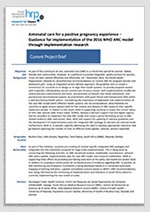Preventing and responding to gender-based violence (GBV) in refugee contexts and emergencies
HRP Project Brief

Overview
Preventing and responding to gender-based violence (GBV) in refugee contexts and emergencies remains one of the key challenges for the humanitarian sector. Research suggests that approximately one in five refugee or displaced women experience sexual violence. A recent study from South Sudan, points to even higher prevalence in conflict-affected settings, where up to 65% of women reported experiencing intimate partner and/or sexual violence – a rate double the global average.
Health services for survivors of GBV can be lifesaving and are a minimum standard of health care in humanitarian, including refugee, settings. Access to this essential care, however, is often limited. As the lead agency for health, WHO is well placed to institutionalize the health sector response to GBV in crises, within a gender equality and human rights perspective.
This project’s goal is to strengthen the capacity to address GBV in WHO’s emergency work through the following activities:
- Promote and operationalizing responses to GBV within the health sector.
- Ensuring technical and normative guidelines and tools on GBV in humanitarian settings are strengthened to reflect up-to-date evidence and WHO recommendations
- Actively engaging in relevant interagency initiatives, such as the Call to Action on Protection from GBV in emergencies and the Gender-Based Violence Area of Responsibility (AoR) of the protection cluster.
